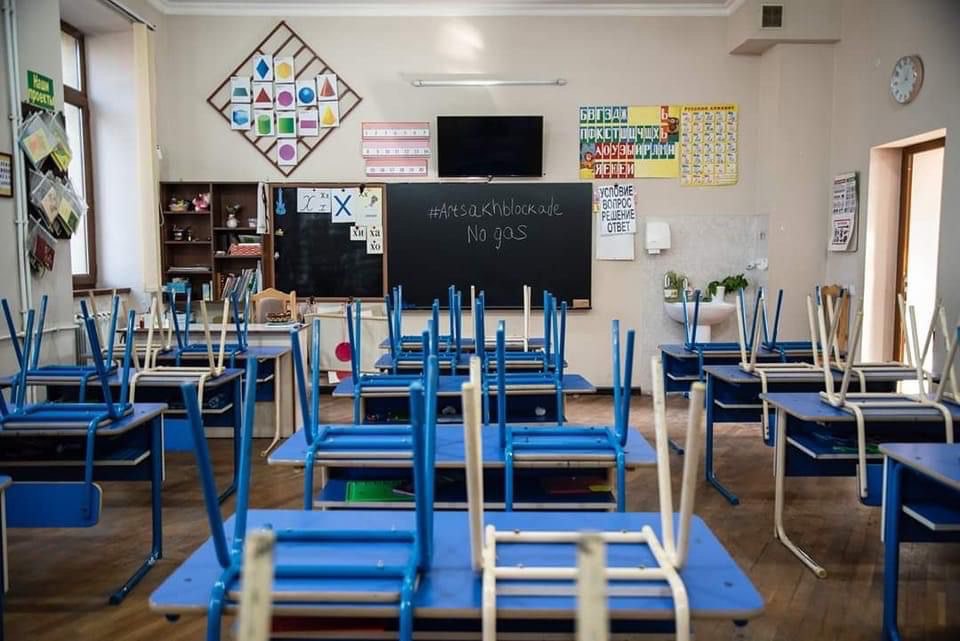
Gas supply to Artsakh has been disrupted for the seventh time since the closure of the Lachin Corridor on December 12.
The gas supply was cut off on February 6 after it was partially restored on January 30. Gas flows resumed briefly on February 7 yet were shut off again the next day.
Artsakh receives its natural gas from Armenia through a single pipeline that runs through Azerbaijani-controlled territory. Artsakh authorities say that Azerbaijan is deliberately obstructing the gas supply in order to precipitate an energy crisis.
“As a result of Azerbaijan’s actions,120,000 residents of the republic, including 30,000 children, continue to face serious difficulties with access to heating and hot water in conditions of severe transport blockade and cold winter,” the Ministry of Foreign Affairs of Artsakh said in a statement on February 7.
The Foreign Ministry said that the interference with gas supplies, amid the ongoing blockade, is part of Azerbaijan’s “long-term policy of exterminating the people of Artsakh in their historical homeland.”
“To achieve this goal, the Azerbaijani authorities have resorted to the blockade of Artsakh and the disruption of critical energy infrastructure, thereby creating unbearable living conditions and dooming the civilian population to incredible hardships,” the statement reads.
Azerbaijani activists sponsored by the government have been blocking the Lachin Corridor, the sole route connecting Artsakh with Armenia and the rest of the world, for nearly two months. Food and medical supplies have been dwindling, since regular imports of basic goods from Armenia have stopped. The humanitarian crisis has been compounded by the periodic disruption of gas, electricity and Internet connection, which the Artsakh authorities blame on Azerbaijan.
The lack of gas has forced schools to shut down. Artsakh authorities announced on February 7 that classrooms that teach grade levels 1-8, preschools, extracurricular activities and professional schools will be temporarily closed. All 118 schools in Artsakh were shut down on January 19 due to the lack of proper heating amid freezing winter temperatures. Schools resumed classes on January 30, yet starting this week only high school level instruction will continue, with reduced class times. As a result, 41 kindergartens and 20 day schools have been closed, and over 5,500 school-age children cannot attend classes.
— When should we wait for the next gas outages?
— Better you ask Azeris, not us…ArtsakhGas employees check the gas pipes before opening the valve. Stepanakert, #NagornoKarabakh pic.twitter.com/TScJ726itn
— Marut Vanyan (@marutvanian) February 7, 2023
Transportation within Artsakh has also been impacted by the unreliable gas flows. Artsakh residents regularly travel between the capital Stepanakert and rural regions for work, school or shopping. Residents have been unable to travel between the city and countryside, because they do not have sufficient fuel to fill up their cars, according to a report published by 23 non-governmental organizations from Artsakh this week.
The simultaneous obstruction of the gas and electricity supply has made it difficult for residents to heat their homes. According to the report from Artsakh NGOs, 80-percent of residents heat their homes with gas. They have been unable to switch to electricity, because the only power line providing Artsakh’s electricity supply has been damaged since January 9.
Artsakh receives its electricity from a high voltage power line that runs along the Goris-Stepanakert highway through Azerbaijani-controlled territory. Artsakh authorities say that Azerbaijan prevents Armenian repair teams from accessing the power line.
Andranik Khachatryan, director of ArtsakhEnergo overseeing Artsakh’s energy supply, said this week that the damage to the pipeline is not serious and could be repaired within hours.
Artsakh has been relying on the Sarsang hydroelectric power plant in the Martakert province for its electricity. The government of Artsakh has instituted a rolling blackout to conserve the existing electricity supply. Residents lose power for six hours per day. Yet authorities say that because the electricity grid is overburdened, some homes have been losing power for longer periods of time. Authorities predict that “there will be serious issues if the current situation persists” and mandated blackouts will likely be lengthened.
The closure of the Lachin Corridor has compromised Artsakh’s medical system. All planned surgeries in Artsakh have been temporarily suspended. As of February 8, 76 patients have been transferred from Artsakh to Armenia by the International Committee of the Red Cross for treatment, Artsakh authorities say. According to the report from Artsakh NGOs, basic medication is not available in pharmacies. Diapers and feminine products have also run out in stores.
Under the ceasefire agreement ending the 2020 Artsakh War, Azerbaijan is committed to guaranteeing “traffic safety along the Lachin Corridor of citizens, vehicles and goods in both directions.” Russian peacekeepers were also deployed to the corridor to protect its security.
A senior official from the Russian Foreign Ministry defended the Russian peacekeeping mission against criticism that it has not done enough to reopen the Lachin Corridor.
“The Russian peacekeeping contingent remains the only guarantor of maintaining stability in the Nagorno-Karabakh conflict zone,” Pyotr Ilyichev told the Russian press on February 8.
Ilyichev dismissed Armenian Prime Minister Nikol Pashinyan’s suggestion that the mission should be replaced by an international mission approved by the United Nations Security Council or receive a UN mandate. Pashinyan has called the Russian peacekeeping force a “silent witness to the depopulation of the Nagorno-Karabakh region.”
“There is no need to give it a UN mandate since the modalities of our peacekeepers’ activities are already clearly fixed in the first tripartite statement of the leaders of Russia, Azerbaijan and Armenia dated November 9, 2020,” Ilyichev said.



Be the first to comment